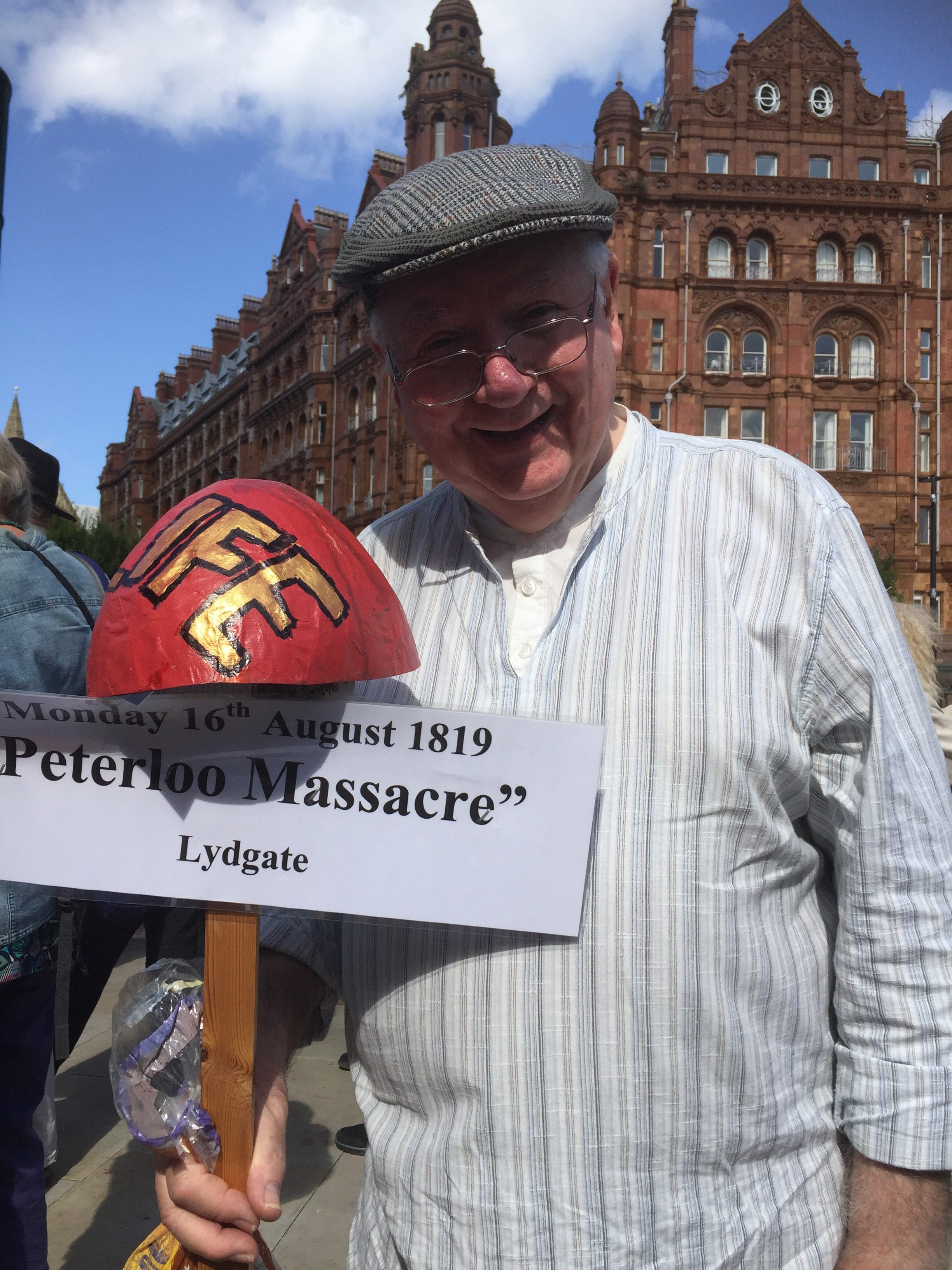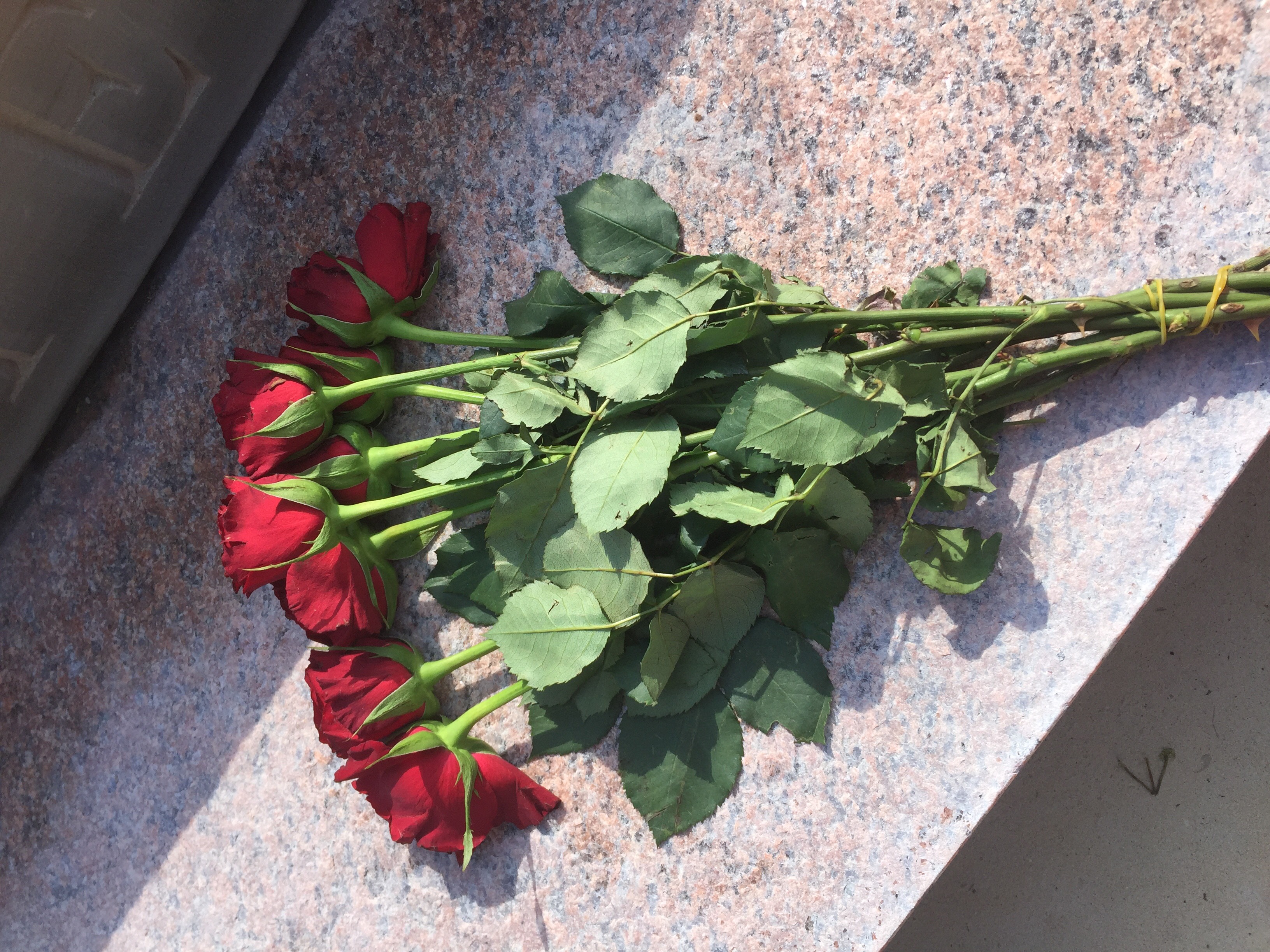“Let’s reboot democracy,” the man on the microphone says, to a loud roar of cheers from the crowd.
It’s the second day of the Peterloo bicentenary commemorations at what was St Peter’s Field in central Manchester. The site is now flanked by the plaza of Manchester Central Convention Centre and is overlooked by the Midland Hotel.
Day two is the Six Acts event, organised by grassroots protesters. It will produce a manifesto for reform based on an online vote.
The immediate effect of Peterloo was to cause the Government of the time to pass the Six Acts which were aimed at suppressing any meetings for the purpose of radical reform. Now the name of Six Acts is being reclaimed to call for democratic reform. Its website went live during the event and people have the chance to vote for the submissions. The first formal publication of the Six Acts document will be at the end of September; a single page mandate articulating the people’s demands for democratic reform.
The Peterloo Massacre happened on August 16, 1819 when a peaceful crowd of 60,000 converged on the city from across the region calling for parliamentary representation to listen to radical orator Henry Hunt. It was against a backdrop of poverty, unemployment and hunger, following the Napoleonic Wars, which led to the repeal of the notorious and unpopular Corn Laws (restricting the import of foreign corn).
It’s staggering to think that Manchester, the second-largest city in England, had no parliamentary representation at the time.
Magistrates ordered the 15th Hussars to disperse the crowd, charging at the protesters on horseback with swords drawn, arresting Hunt and killing their first victim, a two-year-old called William Fildes who fell out of his mother’s arms.
In just 30 bloody minutes, 18 people were killed and more than 750 were injured. The newspapers of the time dubbed it Peterloo in a front-page headline in a sardonic nod to the Battle of Waterloo, which was very much in the public consciousness.
 Fast forward to 2019 and a Peterloo Memorial designed by Turner Prize-winning artist Jeremy Deller, and controversially unveiled by the council without a whiff of publicity last week, had flowers placed on it. The names of the victims and the places they came from are engraved into the stone steps which are inaccessible to those with disabilities. As performances of From The Crowds took place on Friday, campaigners vocally protested about the lack of accessibility by the memorial’s steps.
Fast forward to 2019 and a Peterloo Memorial designed by Turner Prize-winning artist Jeremy Deller, and controversially unveiled by the council without a whiff of publicity last week, had flowers placed on it. The names of the victims and the places they came from are engraved into the stone steps which are inaccessible to those with disabilities. As performances of From The Crowds took place on Friday, campaigners vocally protested about the lack of accessibility by the memorial’s steps.
Deller told Radio 4 that addressing accessibility had been “enlightening”. His six-foot high work references other State attacks on civilians such as Bloody Sunday and Tiananman Square, with a compass pointing to their coordinates.
The sun finally showed its face on Saturday and smiled down on the city centre unlike the previous day when unrelenting heavy failed to mar the large-scale organised events as people turned out in large numbers, huddled beneath brollies.
People carried home-made and professionally produced placards and banners reading ‘equality’, ‘love’ and ‘liberty’. Some wore period dress while others were dressed in Suffragette clothing complete with the violet, green and white sash – the colours of the movement. While Peterloo led to the vote for more men, universal suffrage was a long way off for the protesters at St Peter’s Field two centuries ago.
The Riot Act was read by a chorus of actors from Sheffield creating a cacophony of noise and an eerie and tense atmosphere which built to a crescendo, symbolising the horrific violence that took place at this site.
 The sun briefly disappeared behind the clouds creating long shadows which added to the atmosphere of the sombre performance. There was uplifting music, too, as a startling papier mache effigy with Prime Minister Boris Johnson’s distinctive face and blond mop of hair was paraded above the crowd with the body of a minotaur, as people clapped.
The sun briefly disappeared behind the clouds creating long shadows which added to the atmosphere of the sombre performance. There was uplifting music, too, as a startling papier mache effigy with Prime Minister Boris Johnson’s distinctive face and blond mop of hair was paraded above the crowd with the body of a minotaur, as people clapped.
Toddlers ran about and babies in prams watched proceedings. There were young people, the middle-aged and those who were a little older. It was a right old mix but there was a sense of grassroots radicalism and fierce northern pride.
A leaflet was handed out in memory of William Ogden, printer, of Wood Street, Manchester “beaten with truncheons and sabre-cut to his head and eye at Peterloo”. He was buried at St Anne’s Church.
Peterloo led to the foundation of The Manchester Guardian, my alma mater, the place where I was proud to have covered the north for so many years. I thought about the late, great Guardian photographer Don McPhee, a much-missed colleague and friend, who covered the Orgreave riots for The Guardian. McPhee’s image of a miner in a toy police helmet eyeballing a real cop became famous around the world. Many people have drawn parallels with Orgreave and Peterloo due to the State’s violence against peaceful protesters.
 David McGealy from Oldham Community Radio offered me a piece of Emergency Red Leicester cheese. I was a bit baffled until he explained that a man called Mr Brierley was saved from certain death at Peterloo by the hunk of cheese hidden beneath his hat when one of the yeomanry swung a sword at his head.
David McGealy from Oldham Community Radio offered me a piece of Emergency Red Leicester cheese. I was a bit baffled until he explained that a man called Mr Brierley was saved from certain death at Peterloo by the hunk of cheese hidden beneath his hat when one of the yeomanry swung a sword at his head.
“I’ve been coming to the commemorations for Peterloo for the last ten years,” he said. “When I first used to come, there was about 20 people but because of all the publicity it has grown and there are now 200 or 300 people attending. I thought it was disgraceful that Manchester has not recognised Peterloo and has basically concealed it or ignored it for 200 years.”
I overheard a woman saying she’d not been able to come to the commemoration in 2018 as she was “wearing the wrong shoes at the time”.
The place was stuffed with these little snippets that form a rich and fascinating tapestry of the story of political struggle and the desire to right the injustice of Peterloo and keep the memory alive in modern 21st century society.
Ken Earith, a retired teacher from Manchester, and his wife Julie were watching events from their vantage point on the steps in front of Manchester Central Convention Centre. “We were both at the 150th anniversary at the Free Trade Hall,” he explained. “I just think it is something that people should know about. Why is it never taught? It should be taught at schools as it’s so important – not just to this area, but nationally.
“It led to massive change which had an impact on social history. We have both lived through really good times, but we can see things changing rapidly with more poverty. Events of today are really chiming with what was happening in 1819. It is a worry for us when we think of our grandchildren and their future.”
He points out that even if Peterloo was on schools’ curricula it would “only mention the facts and not the significance. People do not realise the legacy.”
 Author Professor Robert Poole, who has written a book on Peterloo and describes the events of that day as “one of the defining moments of its age”, disagrees slightly about the stark similarities between then and now. He points out they were specifically protesting about “better parliamentary representation”. In 2019, we have that representation in parliament, although it only ever represents 50 per cent of the population, he said.
Author Professor Robert Poole, who has written a book on Peterloo and describes the events of that day as “one of the defining moments of its age”, disagrees slightly about the stark similarities between then and now. He points out they were specifically protesting about “better parliamentary representation”. In 2019, we have that representation in parliament, although it only ever represents 50 per cent of the population, he said.
He added that, in previous years, the memorial event has been a low-key gathering. With the lottery involvement, Friday was a choreographed performance which differed from other years. But Saturday’s events were more of a “grassroots” performance responding in a way that was “a lot more radical”. He went on to say that, in a country where all adults have the right to vote, the talk about “rebooting democracy” comes as “there’s a crisis in democracy”.
Following the protests about Deller’s memorial, Manchester City Council said it has “listened to, and engaged with, the concerns of disability access campaigners who have raised this issue, and we are committed to making the monument fully accessible – so that everyone can reach the top”. An announcement about how this will be achieved will be announced in the next few days.
Whatever happens, long may the spirit of Manchester and Peterloo live on.




